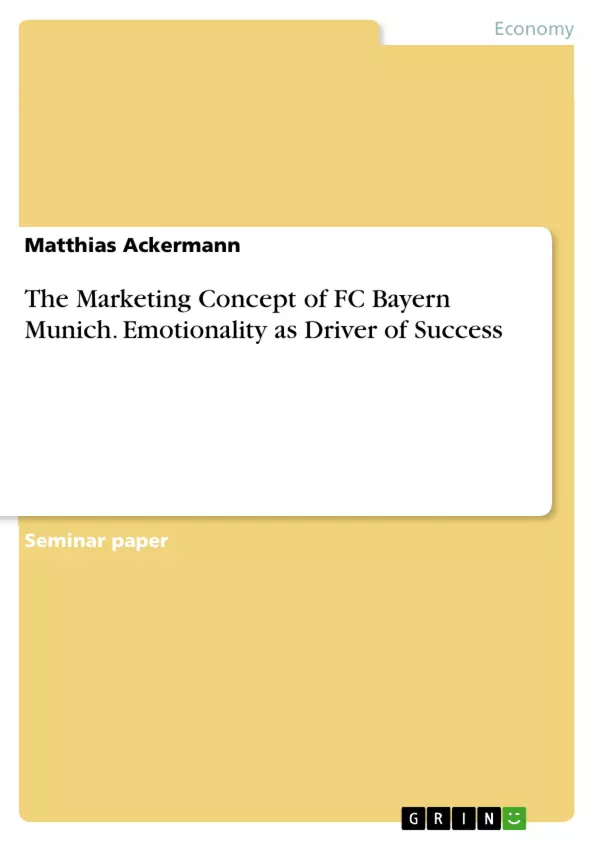The football club FC Bayern Munich is one of the “global players” in the business of football. The FC Bayern Munich AG is the leading football company in Germany, that is dominating the German football league not only sportive but also economical. The club could win in the season 2012/13 the historical treble. As the first club in German history they could celebrate the winning of the German championship, the DFB-cup and the UEFA champions league cup in one season. It was the greatest success of the club ever. The effects of the success are the rising interest on Bayern Munich in the country and all over the world. Revenues through staying in and winning the competitions (including matchday and broadcast) increased and the attractiveness especially of merchandising articles boosted in unknown heights. Furthermore the number of membership, the image and the brand value of FC Bayern Munich and of the German Bundesliga raised worldwide. In 2012/13 FC Bayern Munich could present for the first time sales over 400 millions of Euro. Especially to create financial benefit out of sportive success is one of the objectives Bayern Munich could transform in the business. The financial success is an important objective of all companies and also each sportive business. One essential part to reach this goal is the marketing concept.
In this assignment the marketing concept of Bayern Munich with the emotionality as a driver of success, especially in football market, is shown. Within that not only the success of FC Bayern Munich and its impacts on the national and international football market are presented but also the marketing concept of the most successful football club in Germany is analysed. This includes the analysis of the current situation, the marketing objectives and the strategy of the club.
In particular the football division of FC Bayern Munich is focused in this seminar paper.
Inhaltsverzeichnis (Table of Contents)
- Introduction
- Problem and Objectives
- Procedure of Seminar Paper
- FC Bayern Munich
- FC Bayern Munich E.V.
- The Company - Structure & financial Situation
- Marketing Concept of FC Bayern Munich
- Marketing Analysis of current Situation
- European Football Market
- Impressive FC Bayern Munich
- Five Forces Model of Porter
- Strengths, Weaknesses, Opportunities and Threats (SWOT)
- Marketing Objectives
- Marketing Strategy
- Product Policy
- Price Policy
- Distribution Policy
- Communication Policy
- Outlook
Zielsetzung und Themenschwerpunkte (Objectives and Key Themes)
This seminar paper explores the marketing concept of FC Bayern Munich, focusing on the role of emotionality as a driver of success in the football market. The paper analyzes the club's success and its impact on the national and international football market. It also examines the marketing strategies employed by FC Bayern Munich, including their product, price, distribution, and communication policies.- The impact of FC Bayern Munich's success on the national and international football market
- The marketing concept of FC Bayern Munich, particularly the use of emotionality to drive success
- The analysis of the current situation, marketing objectives, and strategy of FC Bayern Munich
- The importance of financial success in the sports business
- The role of marketing in achieving financial success in the sports industry
Zusammenfassung der Kapitel (Chapter Summaries)
The introduction establishes the context of the seminar paper by outlining the problem and objectives. It highlights FC Bayern Munich's dominance in German football and its recent historical treble win in the 2012/13 season. The introduction also emphasizes the growing interest in FC Bayern Munich globally and the significant rise in revenue, membership, and brand value resulting from the club's success. Chapter 2 provides an overview of FC Bayern Munich, including a description of its structure and financial situation. Chapter 3 focuses on the marketing concept of FC Bayern Munich, beginning with a comprehensive analysis of the current situation, including an assessment of the European football market, the club's impressive performance, and the application of Porter's Five Forces Model. This chapter also examines the club's strengths, weaknesses, opportunities, and threats (SWOT) analysis. Chapter 3 further explores the marketing objectives and strategy of FC Bayern Munich, analyzing its product, price, distribution, and communication policies.Schlüsselwörter (Keywords)
The primary keywords and focus topics of the seminar paper are: FC Bayern Munich, marketing concept, emotionality, football market, success, financial performance, product policy, price policy, distribution policy, communication policy, SWOT analysis, Porter's Five Forces Model, European football market, brand value, and membership growth. The paper examines the strategic use of marketing to drive success and financial growth in the highly competitive world of football.- Quote paper
- Matthias Ackermann (Author), 2014, The Marketing Concept of FC Bayern Munich. Emotionality as Driver of Success, Munich, GRIN Verlag, https://www.grin.com/document/274808



